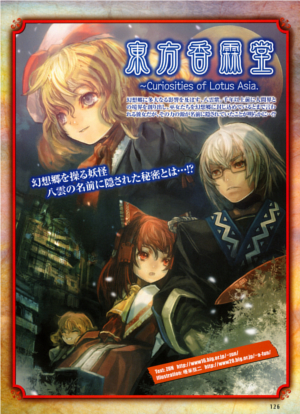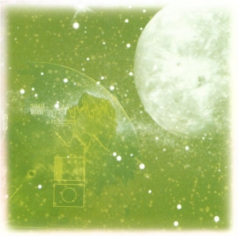|
Chapter 22 The Night the Storm Clouds Rolled In 
Just as one wonders if the towering summer cumulonimbus clouds will open up with a pouring rain shower, they steal away all fo the day's muggy warmth. Moonlight filtered in the window, obscured by rain. Reimu and Marisa had been at the store all day, but as the sudden evening shower prevented them from going home, they remained for dinner. "Yukari's been acting odd lately. *lick*" "Ya say that like she wasn't odd ta begin with. *chomp*" "Why don't you two try swallowing what's in your mouth before you start talking?" I'd been planning on eating alone tonight, so the menu was meager. I don't eat meals often in the first place; "dinner" for me is really just sake with a side of pickled vegetables. A half-youkai like myself doesn't really need to eat much in order to live; it's more for pleasure. If the sake is delicious, that's enough to last me through the night. But that won't do for Reimu and Marisa; if they don't eat regularly, they'll get weak and eventually collapse due to lack of stamina. A lot of foods high in salt content go well with sake and make good snacks; some rice and something salty would probably perk them right back up for a while. "Yukari has been acting odd? Do you mean that youkai, Yukari Yakumo?" I really don't like her. I make my living by collecting things from the outside world, so I really do owe her a lot, since she keeps Gensokyo and the outside world separate, but whenever she's around, it feels like something's looking right through me, and I can't think straight. "Yukari's actually been helping me train lately; it's really weird." "Helping you train...? A youkai? That's unusual for a youkai to train a youkai hunter...it seems like she's plotting something. What are you going to do about it, Reimu?" "It doesn't matter even if she is up to something, since I've been training." "Well, if you say so..." No matter how you look at it, that just means you're doing exactly what Yukari wants you to do.  Gensokyo is the place it is because of Yukari's ability to control borders; her power is what separates Gensokyo from the outside world. There really aren't any youkai in Gensokyo who could stand against her. Needless to say, a human probably wouldn't stand a chance either.
Gensokyo is the place it is because of Yukari's ability to control borders; her power is what separates Gensokyo from the outside world. There really aren't any youkai in Gensokyo who could stand against her. Needless to say, a human probably wouldn't stand a chance either."Yukari...Yakumo, huh? Since she probably chose the name 'Yakumo' herself, I guess you have no choice but to bend to her will. 'Shrine maidens must do as she says.'" Dinner was finished, so we sat outside and gazed at the moon while sipping sake. The rain had wiped away all traces of the day's heat, so it was a crisp summer evening. It was the best kind of night for watching the moon, but Reimu and Marisa had already taken up all the sitting space in front of the entrance, so I stood behind them and enjoyed my sake. "Oh, I was drying some clothes at the shrine before I left. I wonder if they'll be all right, since we had that storm." "Of course they aren't: It was rainin' so hard we couldn't leave, remember?" "I guess so; I'll probably have to wash them again...By the way, Rinnosuke, about what we were talking about earlier...what do you mean by 'I have to do as she says'?" "Well, the name 'Yukari Yakumo' says it all, doesn't it?" I have the ability to tell what something's name is just by looking at it, so maybe I go on a little too much about names, thanks to that. You can generally divide names into two categories. There are names that describe an object's characteristics, and names that determine its characteristics. The former are generally names that describe something's shape, color, other external attributes, or in the case of things like tools, their utility. Most animal, plant, and natural objects are named in this fashion. The latter type of names are usually given to those things whose nature hasn't yet been determined, or to those that the namer wishes to use merely to distinguish it from other things; the names of people and the personal names youkai take on fall into this category, as well as the names of most commodities. These are the names that have the most power over a thing. Since a person's name has a great effect on the sort of personality they develop, parents normally give their children names that hold various meanings; they don't just pick names that sound pleasing to the ear. "The name 'Yukari' means 'violet,' and violet is the outermost color in the rainbow. In fact, when a dragon flies through the sky, the pair of rainbows it leaves behind appear to be an identical set, but in fact, the outermost color of both is violet." "That's true. I've seen two rainbows when I look closely, but I can never quite make out how the colors are arranged." When rainbows appear, they often form in pairs: an inner rainbow that you can see easily at a glance, and an outer rainbow that's considerably fainter. Quite a few people don't seem to know the order of the colors in each rainbow. From bottom to top, the colors of the inner rainbow are violet, indigo, blue, green, yellow, orange and red, but the outer rainbow goes from red to violet in the same fashion; in other words, it's reversed. So, if you put the two rainbows together, from bottom to top the colors progress from violet to red and back again. The border between the rainbow and the sky is certainly colored violet. "Just going by that, her name is obviously a reference to borders, right? But that's just her first name. Her other name, 'Yakumo,' if you take it literally, it refers to the kind of clouds that pile up on themselves in many layers." "What do you mean, if you take it literally?" "Well, the word 'yakumo' isn't used by itself very much. However, it's used quite extensively in the divine land of Izumo. In her case, it's quite likely she's taken it from the verse 'Yakumo tatsu Izumo yaegaki tsumagomi ni yaegaki tsukuru sono yaegaki wo'." "What's that, an incantation?" "It's a poem that was composed by his divinity Susano-o. They say it's the first Japanese poem ever written. Quite surprising, isn't it?" "Huh. I've always pictured Susano-o as more violent. I had no idea he wrote poetry. But what does it mean?" "The contents are very simple: 'In the land of Izumo, covered by beautiful, heavenly clouds, I've built a great fenced mansion to let my wife, Princess Kushinada, live a peaceful life in seclusion.'" "So...it just means he built a house? Why bother with a poem about something like that?" "Well, it's because it's the first Japanese poem. The way he repeats the word 'yaegaki' over and over really brings out his merry spirit at having finished that house, don't you think?" "It seems more foolish to me." Well, what about a shrine maiden calling what the gods do foolish...? "Getting to the point, aside from the primary meaning of borders, Yukari Yakumo's name also has the hidden meaning of 'a strong fortress to keep the gods trapped inside'. Now, if you substitute shrine maidens for the gods, it obviously refers to Gensokyo. Yukari will never let the shrine maidens escape from Gensokyo." Reimu became quiet. She probably had a lot to think about. It's nice enough to sit in silence and drink sake, but you only get so much out of it, so I decided to renew the conversation on a different topic. "Oh, and speaking of that particular verse, you can see yet another side to it if you say it out loud." "Yakumo tatsu...uh, how'd it go again? I forgot." When Marisa said this, I recited it once more. "Isn't the sense of rhythm from the repetition of the word 'yaegari' pleaseant? And it goes well with the 'ya' from the very first word, 'yakumo'." "Ya, ya, ya...it's almost too much 'ya'. I wonder why he wrote it that way?" "Of course, there's a meaning behind it. But the true meaning is hidden in another word pronounced 'ya'." "Really? What would that be?" "Why, the splendid 'night' that always hides itself from the great Amaterasu." The wind had gotten rather cold. As the ground that had dampened earlier that evening dried, it probably caused the wind to pick up. I sipped on my "fuel." It didn't cool me down too much, but it did speedily give rise to a new line of thought. After all, if you look at the world the same way all the time, you won't get any ideas more profound than those that lie in the realm of common sense. "The number 'eight' is actually very closely related to 'night'. Can't you read both characters as 'ya'?" "Well yeah, but you can do the same thing with 'yakiniku', since you eat it at night. But usually, that's pronounced 'yoru'. Isn't that all just coincidence though?"  "You might think so, if it were just the kanji for 'night' and 'eight', but what's interesting is that those two words are almost the same in other languages, too."
"You might think so, if it were just the kanji for 'night' and 'eight', but what's interesting is that those two words are almost the same in other languages, too.""Really? I don't know much about other languages." "In English, it's 'eight' and 'night'; in Latin, it's 'oct' and 'noct'; in German, it's 'acht' and 'nacht', and it a lot of other languages 'eight' and 'night' sound very similar as well. Are those all coincidences?" "Hmm...I don't know much about the countries in the outside world. So why are the words for 'night' and 'eight' so similar?" "There are a few explanations, but unfortunately ho one has a definitive answer." "What? Why ya bringin' up somethin' you don't even get?" "It's not that simple. To begin with, etymology is probably different for each language." Marisa didn't seem satisfied with that answer, so I promised I'd look into it some more. "Anyway, we can speculate about why that is in Japanese, at least. The 'ya', or eight, in words like 'yakumo', 'yaegari' and 'yaorozu no kami' doesn't literally mean the number eight, but a very large number of something...now, I hope you'll notice that whenever it's used that way, it's always pronounced 'ya'." "Let's see - a great number of hills is 'yasaka'; when cherry blossoms pile up it's 'yaezakura', the great many-headed demon Yamata no Orochi...hm, it really is pronounced 'ya' whenever it means 'many'." "All of these words are very old words that existed before we started to use kanji for writing. You don't say that you have 'eight' of something in modern Japanese if you want to say that you have a lot." "Yeah, it'd be a huge pain to have to make enough food for 'eight' people." "Anyway, my point is that the only reason this word for many, 'ya', was written with the character for 'eight' is because eight was a big number." "Eight is a big number? Aren't there lots of bigger numbers?" "Well, it's true that nine is a larger digit, but eight and nine are both big numbers. However, nine, read as 'kyuu', is linked to the 'kyuu' in 'eikyuu', or 'eternity', so it's been linked to the infinite for a long time. After all, if there are a lot of something, it's still a finite amount, so it's obviously less than infinity. That's why eight - the number one less than nine - was given the pronunciation 'ya', I believe." "Hmm. So you mean the character for eight wasn't always read 'ya'? What's its connection to the night, then?" "Well, it's the word for 'night' that was originally pronounced 'ya', not 'eight'. Anything that was incredibly high in number was linked to the night." And that's not all; the Japanese names for numbers hide many more secrets like this. "I wonder why the word for a great number of things was the same as the word for night?" "To answer that, all you need to do is gaze up at the sky on a moonlit night like this. Isn't it obvious why the word for night came to mean 'a great many'?" The clouds that had given us a sudden squall earlier that evening had completely vanished; in their place, the skies of Gensokyo were filled with a countless number of stars. Forgetting my sake, I gazed up at the starry sky. The silvery river that flowed through the sky was more than enough to crush any reckless challengers who thought they could count every star within it. In comparison, the sun floated high in the daytime sky without peer. It's only natural then that the great Amaterasu - that is, the sun - would be worshipped as the highest god. A countless number of stars twinkled in the sky. Their faint light made them seem like they had to hide themselves from the sun. All across the world, the night sky expressed how tiny humans must have felt in comparison to the sun, as well as the pain the youkai felt from it. "Anyway, I think it'll be okay even if Yukari's planning something, so I guess I just have to train." "Hm...maybe so. It will be good for you to get more powerful through training, and besides..." There was no way to stand up to Yukari, nor was there any reason to do so. "Yep. Anyway, I'd probably better get back to the shrine and figure out a new training schedule." "But I'd wash that laundry again before that if I were you. That storm probably did a number on it." "Ohhh..." "Evenin' storms happen all the time durin' the summer. Even if it's sunny all day, hangin' your laundry out to dry and leavin' your house like that is just careless, y'know." "Well, the laundry was already wet, so what's the harm in a little rain?" "Mm, maybe you're right." "No, that's not it. If you don't take better care of them, your clothes will fall to pieces someday. I suppose with all your danmaku battles they're not fated to live long to begin with, but that means you should at least take proper care of them when doing laundry. It's important to value your possessions." "All right. I won't leave the shrine until they're dry tomorrow. I bet they'll dry up in a flash under the summer sun." "But if ya fall asleep, it'll be just as bad as leavin'." The number for "one" can be pronounced "hito," or "hitotsu." When you count 1, 2, 3 as "hi, fu, mi," one is "hi." Needless to say, that's the same "hi" as the word for "day." In other words, the sun. The Japanese counting system starts with the sun, goes on to the wind (fuu), the water (mizu), the sky, the earth, and connecting everything to the night. By counting to nine, the Japanese number system includes everything in nature. Even a single number has so many deep meanings to it. So needless to say, a name that incorporates numbers can easily hide very deep meanings, so it's not surprising that someone like a strong youkai would do so. It's a huge mistake to think numbers are merely words to measure quantity - if that's what you think, you'd better look at the world around you a little harder: you might start seeing a great number of carefully hidden secrets. |